Students “fish” for new ideas alongside Cowichan Tribes
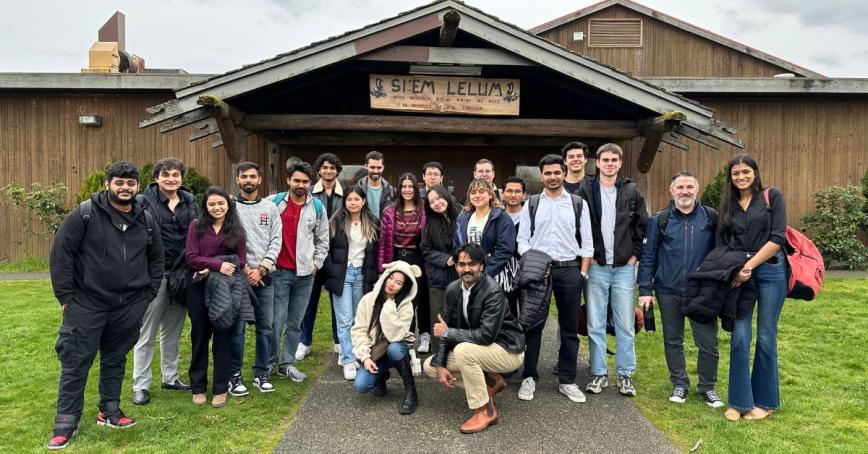
How did it start?
On a drizzly but mild April day, six teams of Bachelor of Business Administration students climb off the bus in front of the Cowichan Tribes Si’em' Lelum Gymnasium. After an initial briefing and meeting the previous month, they are here to present their proposals to the Quw’utsun Kw’atl’kwa Enterprises Ltd (QKE) board exploring the feasibility and recommendations for an aquaponics and cryptomining project.
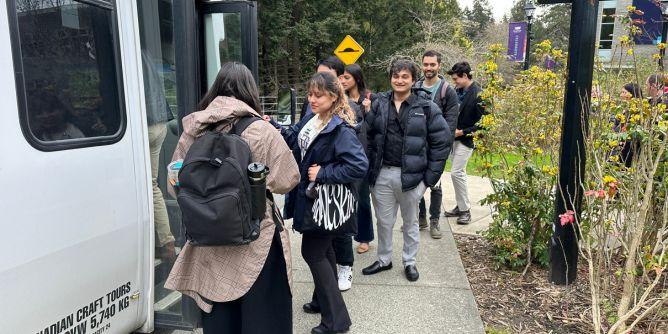
BBA students traveling to Duncan, BC for the day.
Along with instructor and Indigenous scholar Tasha Brooks, the students are working closely with QKE to develop a business proposal involving the innovative combination of aquaponics and cryptomining.
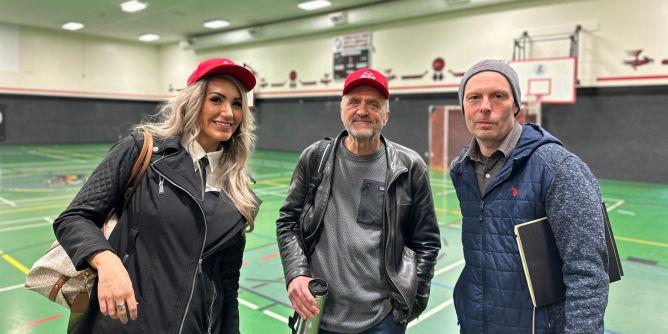
Left to right: Tasha Brooks (Indigenous scholar and assist. prof.), Todd Thexton (assist. prof.) & Shawn Baubutt (executive director of QKE).
An aquaponics facility is a contained closed-loop system where fish are raised in tanks with compatible fruit and vegetables growing soilless. The nutrient-rich natural fertilizer created by the fish nourishes the plants which in turn help to purify the water for the fish.
Cryptomining is the use of powerful computers to solve complicated math problems to validate and secure digital transaction resulting in the earning of cryptocurrency like Bitcoin.
But what do strawberries, catfish and high-powered super computers have in common? The BBA students are partnering with a local First Nation to find out how this innovative combination can diversify revenue in the commercial fishing industry and improve food security.
Brooks, who recently successfully defended her Doctor of Business Administration thesis at RRU, says when she heard about the applied learning projects at Royal Roads, “a lightbulb went off.”
“I thought ‘maybe this project can help support QKE and in understanding if aquaponics is a viable project'" says Brooks, who is also member of the Cowichan Tribes, an assistant professor in the BBA program and an RRU Master of Business Administration alum.
The initiative, which Brooks proposed, aims to provide food sovereignty and security for the Cowichan Tribes while diversifying their revenue streams.
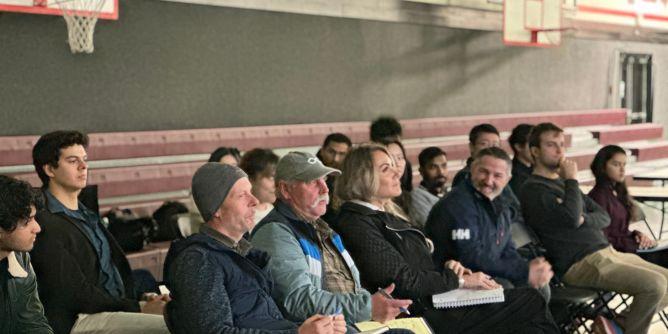
BBA students, instructors and QKE board members watching student proposal presentations.
QKE, an enterprise within the Cowichan Tribes, wants to explore a new and sustainable way to diversify revenue within the commercial fishing industry.
“The commercial fishing industry is in decline”, says Brooks. As a result, QKE is no longer able to rely on their current licenses and quotas to generate the same amount of profit that it used to.
It was the perfect case for BBA students to immerse themselves into, says Brooks, given the program’s focus on innovation and sustainability. The curriculum is entirely project-based, she explains, and this project gives students the chance to get hands-on experience in finance, accounting, management and marketing.
Okay, but why combine aquaponics and cryptomining together?
“If we’re wanting to do an aquaponics facility and wanting to make money off of it,” says Brooks, “we’re going to need to find a way to supplement the first few years of losing money especially with the fishing industry in such a decline, we can’t rely on our licenses and quotas to generate the same amount of profit year over year.”
There is a large startup cost for aquaponics for the first few years before it starts to generate revenue and the income made from cryptomining can help offset the start up costs. In addition, cryptomining servers run around the clock, generating excess heat that can be captured to heat the aquaponics facility.
While the processes of both were unfamiliar to the students, their experience allowed them to dive in and get their feet wet in a way a traditional learning experience couldn’t.
What did the BBA students take away from the project?
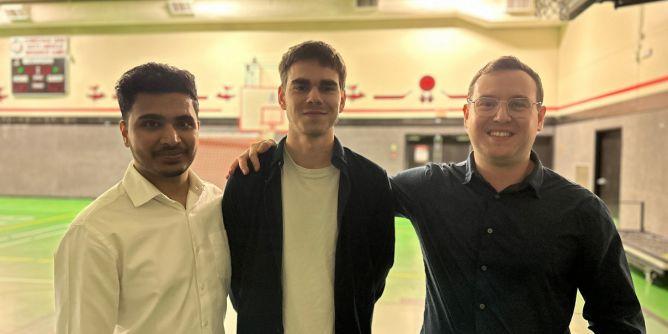
Left to right: Adeeb Shaikh, Emile Fremaut & Lawson Currie.
It was one of the most engaging projects Lawson Currie says he’s worked on as a student.
“It was really nice to present something to the client that is valuable,” Currie says, who is in his third year of the BBA program. “When I talk about it with other people from other universities, they’re like ‘wow, I wish I was doing that’, and it’s a nice surprise.”
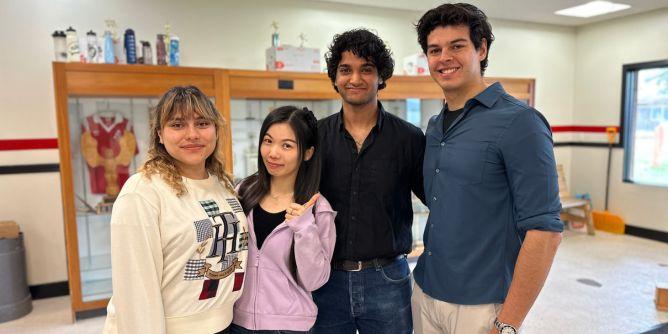
Left to right: Dana Solis Pasaran, Hongshan Wei, Kirtan Dave & Andres Coronado Valdez.
Classmate Kirtan Dave agrees.
“I’ve learned so much about myself and this project personally has put me in that perfect zone where there’s pressure but you also have to impress your clients with your output and that I think has brought out the best in me.”
Brooks is impressed by the understanding and depth of knowledge of the students.
"For the students to switch between understanding what different people want and need to hear is a lesson I didn't learn early in my education. They’re acting like consultants now, and I'm so proud of them."
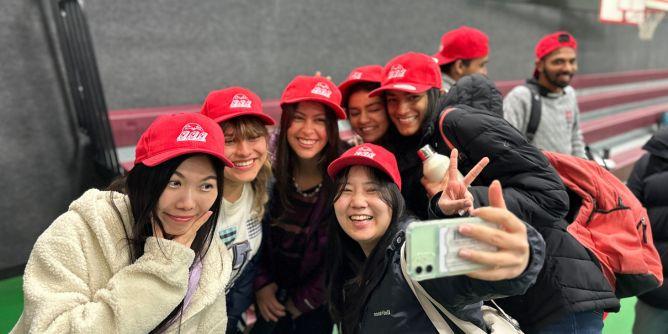
BBA students are excited about their new hats gifted to them by the Cowichan Tribes.
Long term capacity-building for the Cowichan Tribes
Brooks is passionate about supporting entrepreneurship in first nation communities. “As a nation we’re ready to be innovative, we’re ready to be leaders,” she says.
The aquaponics facility will provide opportunities for members to be trained to run, maintain and build on the production. There is also the potential to go into market with value-added items made from the fish and produce like jams, preserves, dried fruit, canned fish and more. On the cryptomining side, there is opportunity for members to be trained to understand the world of crypto and cryptomining.
Brooks explains that “if any member did want to pursue any educations surrounding running the aquaponics facility, there is that option within CT to have their education supported” and “any of our current employees I thought it might be an interesting opportunity as well that RRU has a graduate certificate in economic development.”
Brooks emphasizes that there is a lot of government investment in food security and renewable energy available right now which will minimize the risks of the project. She also wants other Indigenous communities to know these types of opportunities exist and that there are “programs and university partnerships that support initiatives like this and can boost the economic achievements of Indigenous communities.”
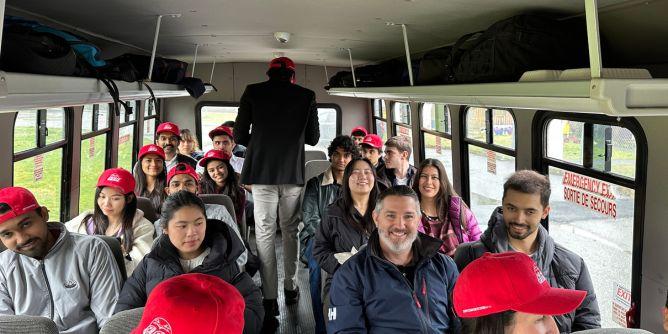
Back on the bus after a day presentations for the return trip to Victoria, BC.
Learn more about the BBA program.